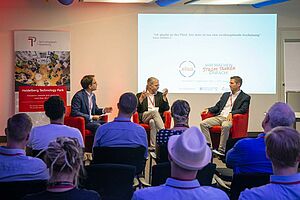“Battery and hydrogen power are not mutually exclusive. Both technologies will coexist.” This is how founder and CEO of start-up eliso GmbHJohannes Brodführer envisages future mobility. On Monday, September 16, 2019, together with Dr. André Weber, battery and fuel cell researcher at Karlsruhe Institute of Technology (KIT), he addressed future mobility at the “E-mobility” Zukunfts Bar, which is a platform promoting dialog between academia and business, addressing technology transfer opportunities.
Dr. Weber focuses primarily on fuels, which he analyzes down to the smallest unit, in his research. His objective is to make generating energy to power vehicles as efficient as possible. Since the transfer of energy always involves some loss, Dr. Weber wants to discover how such loss can be minimized or even eliminated. Research on relevant products and processes is conducted at KIT, often in projects funded by the Federal Ministry of Education and Research (BMBF). Other projects are commissioned by industrial giants such as BASF, Bosch and BMW. Mr. Brodführer’s start-up eliso is involved in the necessary e-vehicle charging infrastructure, guiding its customers throughout, from first consultation to installation, operation and upkeep of battery charging points.
After describing their work, both speakers answered participants’ questions. An electric-car driver inquired about when it would be possible to travel longer distances in the comfort of his car. Dr. Weber predicted that although battery capacity would double, he doesn’t think that long-distance travel without the need to recharge is very likely. Neither speaker could conclusively answer the question about the alternative to petrol and diesel that would most likely prevail. However, Dr. Weber thinks that the political will to implement an alternative is lacking. Mr. Brodführer stresses that although there is a high demand, many regulatory obstacles are hampering the rapid expansion of the charging infrastructure.
Start-ups such as eliso GmbH, which was established in 2016, benefit from research such as that conducted at KIT. Successful knowledge and technology transfer from research to business promotes the establishment of start-ups that test innovations in the market.
